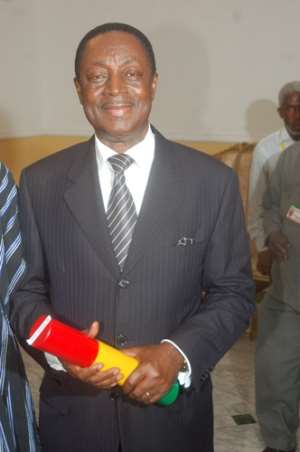
Dr. Papa Kwesi Nduom has asked government to avoid taking panicking measures to mitigate the global economic crisis, otherwise known as credit crunch, of which Ghana is one of the affected countries.
In an exclusive interview, Dr. Nduom described the decision by Finance Minister, Dr. Kwabena Duffour, to withdraw the recent decision by government to withdraw tariffs on foreign investments or imported goods as wrong.
He therefore challenged the Finance Minister to be bold and restore the tariffs on the imported goods in order to guarantee favourable treatment for domestic produce or the local market.
“There is the need to deliberately discriminate against foreign investments, offer good financial support to domestic production in order to encourage local producers,” Dr. Nduom stressed.
Dr. Nduom believes that if the current arrangement is maintained, it will only ensure short term benefits for the country and therefore urged government to look into the future, sacrifice and take bold decisions that will have long term enjoyable benefits that the country stands to gain if the tariffs were maintained.
“There is the need to maintain the tariffs, because that will be the only way that local producers will gear up with the right incentives offered them by government to produce more for the Ghanaian market,” Dr. Nduom noted. He added that there is the need to sacrifice initially in order to gain in the long term.
He questioned what might have influenced the initial decision by Dr. Duffour to put the tariffs on the imported goods and whether the Finance Minister did not believe in that decision before he went to town with it. He warned that if the knee-jerk decision was as a result of pressures from the World Bank and the International Fund, then the decision is bound to fail.
According to Dr. Nduom, the fact that the country did not achieve the requisite food security and the needed financial growth when the country adopted a similar approach a few months meant such prescriptions from the Breton Wood institutions were doomed to fail. He therefore urged government to keep its campaign promise of putting higher tariffs on imported goods in order to create a favourable environment to enhance local production.
Dr. Nduom questioned the benefits that the country derived when it adopted similar stimulus during the NDC administration from 1993 to 2000 and the NPP administration that adopted similar stimulus as the one being prescribed by the current government.
“The fact that the situation still persists means we do a different thing this time around,” Dr. Nduom stressed, adding that the only way is to encourage and support local production like what some developed countries like the United States is doing and sacrifice a little in order to achieve the desired result.
With the current attitude of government towards foreign investments, he questioned whether it was the kind of change that the NDC promised Ghanaians, stressing that although the administration might have changed, the content is the same as that of the former administration.
He drew attention of government to the import substitution paradigm of CPP under Osagyefo Dr. Kwame Nkrumah where the country produced corned beef, radio and other major local productions. That approach of the CPP administration created a favourable environment for the creation of jobs, adding that “we don't create jobs with over liberalization of trade”.
Studies have shown a differentiation between foreign and domestic actors in the emergency plans being adopted by countries that are injecting stimulus in their domestic economy. It is this differentiation that may give rise to liability as breaching guarantees against discrimination of foreign investors under international investment law.
In general, the emergency measures passed to date can be grouped into three broad categories: These are measures designed to bolster the stability of the financial services industry; measures directed at the financial services industry but structured to increase the availability of credit to other sectors of the economy; general fiscal measures designed to boost public spending and targeting select and strategic industries (including the automobile industry).
Based on this, Dr. Nduom said there was the need to adopt less favourable treatment to foreign investment and indeed foreigners and discriminate towards the domestic players, adding that there was the need to help Ghanaian importers and local producers, saying, it could be one of the many ways of encouraging the creation of jobs.
Source: TODAY Newspaper




 Ghana will make maiden voyage into space should Bawumia become President — Chair...
Ghana will make maiden voyage into space should Bawumia become President — Chair...
 Train crash: Despite the sabotage, we shall not be deterred and will persevere —...
Train crash: Despite the sabotage, we shall not be deterred and will persevere —...
 Tema-Mpakadan railway project a perversion of the original viable concept design...
Tema-Mpakadan railway project a perversion of the original viable concept design...
 Train crash: Elsewhere, everyone involved in the test will either be fired or re...
Train crash: Elsewhere, everyone involved in the test will either be fired or re...
 Ghana, other election bound-countries must build fiscal buffers – IMF admonishes
Ghana, other election bound-countries must build fiscal buffers – IMF admonishes
 Parliament reconvenes late May, denies Speaker Bagbin delaying recall over NDC t...
Parliament reconvenes late May, denies Speaker Bagbin delaying recall over NDC t...
 $100m needed to revitalise Ghana's poultry sector — GNAPF
$100m needed to revitalise Ghana's poultry sector — GNAPF
 Driver arrested for causing train collision on Tema-Mpakadan Railway Line
Driver arrested for causing train collision on Tema-Mpakadan Railway Line
 Police grab trucker for Tema-Mpakadan rail accident
Police grab trucker for Tema-Mpakadan rail accident
 Gov't plans to revise traditional customs following Gborbu child marriage
Gov't plans to revise traditional customs following Gborbu child marriage
